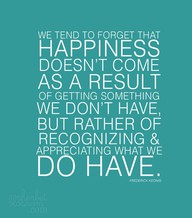Want What you Have
A great article worth sharing.
Recently someone said to me, “Mike, I read the best book of my life a few years ago. It only had four words in it: Want what you have.”
As simple of a concept as this is, I was struck by its wisdom and began to think about it in my own life. Sadly, as I thought about it more deeply, I realized that I put more of my attention and energy than I’d like to admit on either wanting things I don’t yet have or thinking that some of what I have isn’t quite good enough the way it is. Can you relate?
How much of what you have in your life do you truly want (i.e. desire and choose)? How much time and energy do you spend wishing things were different, or that you had a little more of this and a little less of that?
Most of us, even those of us who “know better,” spend and waste a lot of time thinking that things will be better when … we lose weight, get promoted, move into a nicer place, make more money, get married, have children, get out of debt, have more free time, start our own business, get the kids out of the house, retire, recover from a specific injury, illness or setback, or whatever else it is we think needs to change in order for us to be happy and fulfilled.
While the circumstances of our lives — both “positive” and “negative” — do have an impact on us, the truth is that we always have a choice about how we relate to our circumstances and to ourselves in the process. A great job, big house, large amount of money, fit body, incredible relationship, or anything else we say we want, can’t and won’t make us happy if we don’t choose to be.
In other words, to create an authentic sense of fulfillment in life, we have to learn how to want what we already have in our lives with gratitude. One of my favorite and oft-used quotes is from author and teacher Byron Katie. She says, “When you argue with reality, you lose, but only one hundred percent of the time.”
Wanting what we have doesn’t mean everything is “perfect” in our lives, which is almost never the case, or that we can’t desire for things to change or evolve in a way we deem positive. It simply means we choose to accept what we have in our life, right now, with a sense of gratitude and surrender.
Surrendering is not about complacency, weakness or giving up — it’s about learning to make peace with life as it is. It’s important for us to remember that the passion, joy and fulfillment we experience doesn’t come from life itself, it comes from us and our ability to accept, appreciate and celebrate what we have in our lives.
Here are some great questions to ask yourself when dealing with some of the most difficult and challenging aspects of your life (i.e. the stuff you say you don’t want):
- What good is here that I’m currently not seeing?
- What is this situation teaching me that I’m grateful for?
- Why is this happening for (not to) me?
- What would it look like if I surrendered to this instead of fighting against it?
- What aspect of myself can I appreciate more deeply as a way of loosening the grip of this issue in my life?
By asking and answering these questions (and others like it), you’ll give yourself an opportunity to look more deeply at some of the challenges in your life, realize that these things are here to instigate growth and expansion, and remind you that you have the ability to choose them consciously — which can take away much of the suffering you may currently experience.
By putting more of our attention on wanting what we already have, and less attention on fixing things or wanting what we don’t yet have, we can create a deep sense of peace and joy in our lives, our work and our relationships, which, more than most specific outcomes or material possessions, is what most of us truly want anyway.
Mike Robbins is a sought-after motivational keynote speaker, coach, and the bestselling author of Focus on the Good Stuff (Wiley) and Be Yourself, Everyone Else is Already Taken (Wiley). More info at www.Mike-Robbins.com


